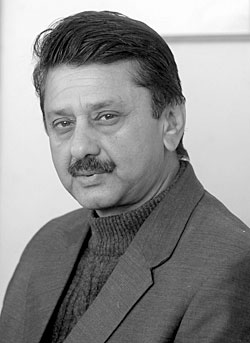 Bharat Bhurtel, rest in peace. |
Bharat Bhurtel didn't leave a note explaining why he killed himself. Anecdotal evidence suggests he had been under immense stress. He had recently finished a commissioned biography of President Ram Baran Yadav. Rather than being content with his achievement, the conclusion of a challenging assignment appears to have frightened him instead. Writer Khagendra Sangraula went as far to say that the office of the president sucked his creative juices dry and then left him in the lurch.
Dead men tell no tales. But what struck a chord among fellow columnists was Bhurtel's decision to complete his weekly piece for Nagarik daily. Even while contemplating death, the popular columnist didn't want to violate the sanctity of a deadline. It was a death in harness above all else. Sangraula may have had a point, but Bhurtel probably took his final decision on an impulse. No precaution is ever enough to save a person from his own rage.
Rage, however, is the motive force of most independent columnists. Occasional contributors analyse subjects that interest them. Reporters fill their columns with the leftovers of their field notes. But a general columnist has to mine his own heart and mind to find grist for the mill. That could be the reason columnists generate so much hostility: everyone thinks that they could do better if only the publisher believed in their talent.
The reality is somewhat more complex. Commercial publishers feel that columnists take away useful column inches. Some fifteen years ago, the chief executive of a media house made this amply clear to a columnist: "The scarce space that I give you is compensation enough. Do you realise I could have given it to Pradip Nepal, Prakash Chandra Lohani or Narahari Acharya and earned their goodwill instead of publishing your rants and making enemies all around?"
Columnists generate deep antagonism among the bean counters of media houses. Everyone knows what an editor, a reporter, an advertising executive, or even the mailing clerk is expected to deliver. But other than a deadline and a word limit, there are no conditions placed upon independent columnists. They don't even punch in the timecard.
The quality of a columnist's output is even more difficult to measure. Some excellent columns do not generate enough response from readers but are acknowledged as authoritative. Advertisers, lobbyists, authorities or interest groups may take umbrage at hugely popular columns. If a columnist took into account the controversy a piece could create, she would be unable to put pen to paper.
Columnists are not popular even in the newsroom, where most of them are considered parasites that thrive on the sweat of reporters. Editors barely tolerate them: columnists often impinge upon their freedom to choose the tilt of the publication. Columnists survive in the media only because committed readers associate certain periodicals with the mugshot of their favourite writers. Shorn of all pretensions, columnists are essentially writers who succeed in establishing an amicable relationship with their readers.
Bhurtel was perceived as a 'democratic' writer and was at his acerbic best while lambasting UML or Maoist personalities. At a reception hosted by Naya Patrika daily some time ago, a friend chided Bhurtel for moving his column out of a weekly newsmagazine, pointing out that "in the magazine, you had a page facing the reader all to yourself. In a broadsheet, your column has to compete with the editorial, among other articles. Your reputation will save the column for a while, but you will have to innovate constantly to retain the loyalty of readers."
Only a columnist of Saurabh's stature could have been so blunt. He then tempered his observations with some empathy, "But I guess you had your compulsions." In retrospect, that statement seems to have been an understatement.
The contradiction of hobnobbing with the rich and powerful while struggling to make ends meet can weaken the will of even the most resilient among us. If the blame for Bhurtel's death has to be laid somewhere, it has to be the accursed profession of punditry.



